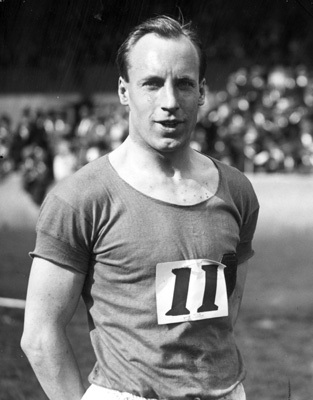
| Roles | Competed in Olympic Games |
|---|---|
| Sex | Male |
| Full name | Eric Henry•Liddell |
| Used name | Eric•Liddell |
| Born | 16 January 1902 in Tianjin, Tianjin (CHN) |
| Died | 21 February 1945 (aged 43 years 1 month 5 days) in Weixin, Yunnan (CHN) |
| Measurements | 173 cm / 68 kg |
| Affiliations | Edinburgh University Sports Union, Edinburgh (GBR) |
| NOC |  Great Britain Great Britain |
| Medals | OG |
| Gold | 1 |
| Silver | 0 |
| Bronze | 1 |
| Total | 2 |
After showing brilliant promise as an all-round sportsman at Elthiam College, Eric Liddell won international honors at rugby football and athletics when he went up to Edinburgh University. Born in China in the aftermath of the Boxer rising, Liddell first entered the Scottish Championships as a 19-year-old in 1921 and scored the first of his five successive victories in the 100 yards and the 200 yards and the 220 yards. He also won the 440 yards in 1924 and 1925. At the AAA Championships, Liddell won the 100 yards and 200 yards in 1923 and the 440 yards in 1924. His time of 9.7 seconds for 100 yards in 1923 stood as a British record for 35 years.
Liddell won seven caps on the wing for Scotland, the first of which came against France at the Stade Colombes which was also the venue for his Olympic triumph, and scored four tries for his country. He gave up rugby for 1923-24 season in order to concentrate on his Olympic preparation. He opened the 1924 track season with a brief visit to America in April, where he finished second in the 200 yards and fourth in the 100 yards at the Penn Relays. When the program was announced for the Paris Olympic Games, Liddell immediately forsook any idea of running the 100 metres as the preliminaries were scheduled to be held on a Sunday. Following this decision, he naturally chose to use the AAA Championships as a final tune-up for the two events on which he had set his adjusted Olympic sights. He won the 440 yards, finished second behind the South African Howard Kinsman in the 220 yards and then went to Paris for the Olympic Games.
After wining a bronze medal in the 200 metres, he improved his personal best by more than one second in the semi-finals of the 400 metres. In a classic final, Liddell, drawn in the outside lane, set a devastating pace, which with head back and arms flailing he somehow managed to maintain to the tape, coming home in 47.6 seconds for a new Olympic, European and British record. Back at Stamford Bridge after the Games for the British Empire vs. USA match, Liddell again ran inside 48 seconds as he made up six yards on the Olympic silver medalist Horatio Fitch in the 4×440 yards relay.
After the 1924 track season, Liddell spent an increasing amount of time on his religious duties and after winning three events in the 1925 Scottish Championships he returned to China to join his father as a missionary. He did not give up athletics completely and in 1929 at a meeting in Tientsin, he ran 49.1 seconds to beat the celebrated German runner Otto Peltzer over 400 metres. Peltzer pressed Liddell to train for the 800 metres at the 1932 Olympic Games, but Liddell ran his last race in 1930 when he won the North China Championship.
Over the next decade, Liddell devoted all his energies to the Church and became a legend in the London Missionary Society, but in March 1943 he was interned in a Japanese concentration camp. The privations suffered in camp took their toll of even the fittest and Eric Liddell died in captivity at the age of 43. Although partly fictionalized, the film Chariots of Fire is a fitting tribute to this remarkable man.
Personal Bests: 100y – 9.7 (1923); 220y – 21.6 (1923); 400 – 47.6 (1924).
| Games | Discipline (Sport) / Event | NOC / Team | Pos | Medal | As | |
|---|---|---|---|---|---|---|
| 1924 Summer Olympics | Athletics |  GBR GBR |
Eric Liddell | |||
| 200 metres, Men (Olympic) | 3 | Bronze | ||||
| 400 metres, Men (Olympic) | 1 | Gold |